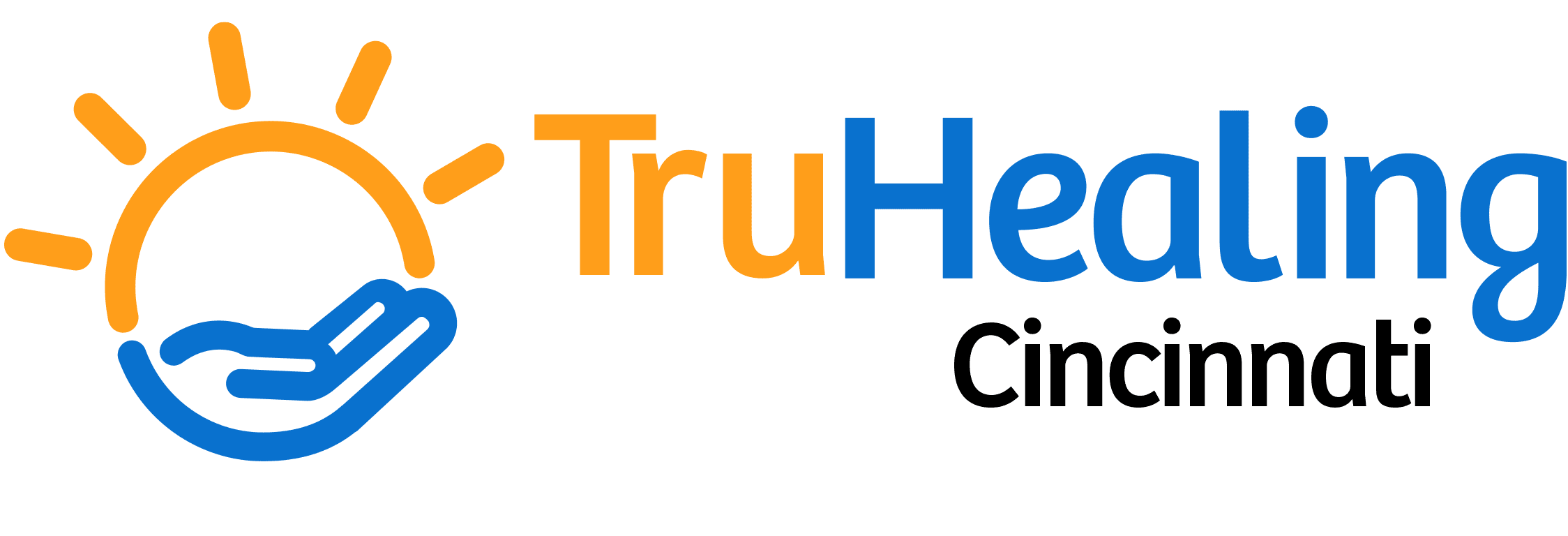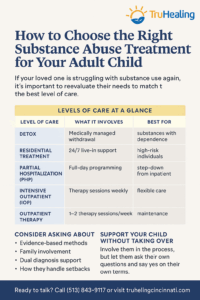When your adult child is caught in the grip of substance use—again—it can feel like you’re standing at a crossroads with no clear signposts. You’ve tried to help. Maybe they’ve been to treatment before. Maybe it worked for a while. Maybe it didn’t.
Now you’re staring down this question again: Where do we go from here?
As an addiction counselor, I’ve worked with many families facing this painful repeat. There’s no perfect formula—but there are reliable, informed steps you can take to choose the right substance abuse treatment for your adult child, especially here in Cincinnati.
Reevaluate Their Needs—This Isn’t About Starting Over
Relapse doesn’t erase progress. It tells us something needs to change.
Before you look at programs, pause to consider your child’s current situation—not just their past treatment history. Ask yourself:
- Have their mental health symptoms worsened?
- Are they using more frequently or differently?
- Have relationships or routines (like work or school) changed significantly?
- Are they asking for help—or resistant?
Even if they’ve completed a program in the past, their needs today might call for a different level of care, new approach, or more integrated support. This isn’t failure. It’s a recalibration.
Understand the Levels of Care Available
Substance abuse treatment isn’t one-size-fits-all. In fact, a good program should fit your child’s current needs and be able to adjust as those needs evolve. Here’s a breakdown:
📋 Levels of Care at a Glance
| Level of Care | What It Involves | Best For |
|---|---|---|
| Detox | Medically managed withdrawal support | Safe discontinuation of substances with risk of physical dependence |
| Residential Treatment | 24/7 live-in support with structure | High-risk individuals, unstable environments, dual diagnosis |
| Partial Hospitalization (PHP) | Full-day programming, home at night | Step-down from inpatient, or high-need outpatient |
| Intensive Outpatient Program (IOP) | Several therapy sessions per week | Flexible care with strong therapeutic support |
| Outpatient Therapy | 1–2 therapy sessions/week | Maintenance, aftercare, or mild substance use |
In Cincinnati, TruHealing Cincinnati offers IOP and outpatient levels of care—ideal for many adults who need structured support without leaving home or work obligations behind.
Ask About the Program’s Philosophy and Clinical Approach
What’s on paper matters—but what’s underneath matters more.
Some programs prioritize abstinence-only models. Others take a harm-reduction approach. Some focus heavily on trauma-informed care. Others lean on clinical tools like Cognitive Behavioral Therapy (CBT) or EMDR.
As a parent, you’re not expected to know all these terms. But you can ask smart questions:
- Is the program evidence-based?
- Do they offer dual diagnosis support?
- What kind of therapy is provided—and by whom?
- Is family involvement encouraged?
- How do they handle relapse?
You’re not being “difficult” by asking. You’re being protective and thoughtful.
Location, Flexibility, and Credentials Matter
These may feel like logistics—but they’re often dealbreakers in the long run. Consider:
- Location: Can your child access the facility safely and consistently?
- Schedule: Do therapy sessions work around work, school, or family obligations?
- Staff: Are the clinicians licensed and experienced in addiction care?
TruHealing Cincinnati is centrally located and designed to support working adults. Our team includes licensed addiction professionals, therapists, and case managers who coordinate care from intake to aftercare.
Support Your Child Without Taking Over Their Recovery
This might be the hardest part. You love your child—and love wants to fix. But the best treatment decisions involve them, not just you.
Let them review options with you. Let them ask their own questions. Let them say yes on their own terms.
That doesn’t mean stepping back completely. It means offering your steadiness without control. Some parents say things like:
- “I’ll support you in going to treatment, but I can’t keep rescuing you from consequences.”
- “This is your choice. I’ll walk beside you, not drag you.”
- “I believe you can do this—and I’m ready when you are.”
Your love isn’t contingent on their success. And they need to feel that more than anything.
❓ Frequently Asked Questions
What if my adult child doesn’t want help?
You can’t force treatment—but you can set boundaries and offer options. Sometimes change begins when consequences shift or when the door stays open without pressure.
Does insurance cover substance abuse treatment in Ohio?
Yes, many programs, including TruHealing Cincinnati, accept private insurance and Medicaid. Our team can help verify coverage and explain costs clearly.
What’s the difference between IOP and PHP?
PHP is more intensive—usually five full days per week—while IOP is more flexible (3–5 sessions per week). Both offer group therapy, individual support, and psychiatric care if needed.
Can I be involved in my child’s treatment?
Often, yes. TruHealing Cincinnati includes family education and support options. Healthy family systems can greatly influence recovery outcomes.
How long does treatment usually last?
It varies. Some IOPs last 6–12 weeks. Outpatient care may continue for months. What matters most is not the speed—but the stability and support of the process.
Ready to Take the First Step?
Choosing a substance abuse treatment program for your adult child is not just a clinical decision—it’s an emotional one. At TruHealing Cincinnati, we walk with families through both.
📞 Call us at (513) 643-9117 or explore our substance abuse treatment programs in Cincinnati.
You’re not starting over. You’re starting again—with clarity, compassion, and support.


